Francisco (Cisco) Werner, PhD
Science and Research Director
Download:
Cisco Werner CV
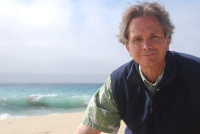 Francisco (Cisco) Werner brings to NMFS a deep and broad blend of marine ecosystem research and science management expertise. His career spans more than 25 years and includes authorship or co-authorship of over 90 refereed publications. Cisco has spent his professional career in academia, with his research efforts spanning the study of the structure and function of marine ecosystems, ocean circulation physics, and the development and implementation of ocean and coastal observing and forecasting systems. Cisco earned his BSc in Mathematics from the University of Washington (UW, 1978) and an MSc and a PhD in Oceanography also from UW in 1981 and 1984.
Francisco (Cisco) Werner brings to NMFS a deep and broad blend of marine ecosystem research and science management expertise. His career spans more than 25 years and includes authorship or co-authorship of over 90 refereed publications. Cisco has spent his professional career in academia, with his research efforts spanning the study of the structure and function of marine ecosystems, ocean circulation physics, and the development and implementation of ocean and coastal observing and forecasting systems. Cisco earned his BSc in Mathematics from the University of Washington (UW, 1978) and an MSc and a PhD in Oceanography also from UW in 1981 and 1984.
Previously, he was the Director of the Institute of Marine and Coastal Sciences (IMCS) at Rutgers University. Prior to his joining Rutgers, he was on the faculty at Dartmouth College's Thayer School of Engineering (1984-1989), the Skidaway Institute of Oceanography (1989-1993), and from 1993 to 2008 at the University of North Carolina at Chapel Hill's Marine Sciences Department (MASC). At UNC-CH, he served as Department Chairman from 2000 to 2007 and was the George & Alice Welsh Distinguished Professor. From 2002 to 2007 he served at the Chairman of the GLOBEC (Global Ocean Ecosystems Dynamics) International Scientific Steering Committee and co-Chaired the PICES MODEL Task Team. He is presently the co-Editor-in-Chief of Progress in Oceanography.
Kristen Koch
Deputy Director
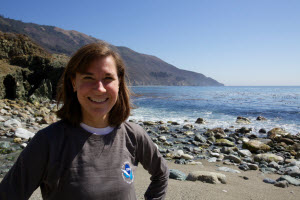 Kristen Koch has been the Deputy Science and Research Director of the Southwest Fisheries Science Center since November 2009. Previously, Kristen was the Deputy Ecosystem Goal Team Lead in Silver Spring, MD (2007-2009) where she oversaw the permanent staff and NOAA's $1.5 billion ecosystem portfolio. In this position, she was responsible for strategic planning and management of NOAA's nine ecosystem programs crossing four NOAA Line Offices (NMFS, NOS, OAR and NESDIS). During the Administration transition, Kristen served as the Acting Deputy Director for the NOAA Fisheries Office of Sustainable Fisheries. Prior to assuming her duties as Goal Team Deputy, Kristen developed science programs for the NOAA Fisheries Directorate, including NOAA's concept for integrated ecosystem assessments (2006-2007).
Kristen Koch has been the Deputy Science and Research Director of the Southwest Fisheries Science Center since November 2009. Previously, Kristen was the Deputy Ecosystem Goal Team Lead in Silver Spring, MD (2007-2009) where she oversaw the permanent staff and NOAA's $1.5 billion ecosystem portfolio. In this position, she was responsible for strategic planning and management of NOAA's nine ecosystem programs crossing four NOAA Line Offices (NMFS, NOS, OAR and NESDIS). During the Administration transition, Kristen served as the Acting Deputy Director for the NOAA Fisheries Office of Sustainable Fisheries. Prior to assuming her duties as Goal Team Deputy, Kristen developed science programs for the NOAA Fisheries Directorate, including NOAA's concept for integrated ecosystem assessments (2006-2007).
Kristen initially served in the Office of Oceanic and Atmospheric Research, where she directed the office managing OAR's laboratories and grant programs (1999-2006). She has received numerous awards from the Department of Commerce for her service in NOAA.
A native of San Diego, she graduated with a B.A from Mills College in California and an M.P.A. from Columbia University.
Roger Hewitt, Ph.D.
Assistant Center Director for Ships and Infrastructure
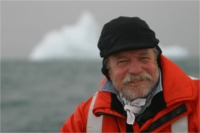
As Deputy Center Director for Ships and Infrastructure, Roger is currently managing a major renewal of the sea-going and laboratory infrastructure for the SWFSC. A new Fisheries Survey Vessel (FSV) is expected to be brought into service in 2013-14 replacing the NOAA Ship David Starr Jordan, which was retired in 2009 after 45-years of service. In addition, construction is underway to replace the La Jolla headquarters of the SWFSC across the street from its current location. Roger's responsibilities include balancing available ship time against research priorities, developing realistic requirements for new ship construction, ensuring that temporary laboratory facilities will allow continued operations without loss of capability, ensuring that the detailed design of the new laboratory will meet our science requirements, and representing the SWFSC in discussions with partners at Scripps Institution of Oceanography, NOAA Fisheries and the NOAA offices involved with facilities and new construction.
Roger holds a Ph.D. in Marine Biology from Scripps Institution of Oceanography, U.C. San Diego, as well as a Ship Masters License from the U.S. Coast Guard and Professional Engineering and Land Surveyor licenses from the State of California.
Roger's research interests include the use of acoustics to conduct resource surveys, foraging tactics of whales, seals, penguins and other seabirds in relation to their prey, biological responses to climatic variability, and resource management schemes that incorporate ecosystem considerations. He has authored over 100 papers, book chapters and reports.
Meghan Donahue
Director, Operations, Management and Information Division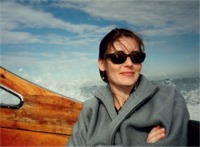
Meghan Donahue serves as the Director of Planning and the Director of the Operations, Management and Information for the Southwest Fisheries Science Center, NOAA Fisheries Service. Meghan started working at the Center as a volunteer in 1995. She spent the next seven years participating in field work, conducting research on marine mammals, serving as Editorial Assistant to the journal Marine Mammal Science and working with the Director of the Marine Mammal and Turtle Division on a variety of international and domestic marine mammal and sea turtle research and management issues. In 2004, Meghan became the Center's Planning Officer.
As Director of Planning and the Director of the Operations, Management and Information Division, she ensures the Scientific Programs are well supported by managing the Center's research planning and strategic development, administration and budget processes, performance management and oversight, environmental compliance and safety, graphics and editorial services, and human resource management.
Sarah Mesnick, Ph.D.
Science Liaison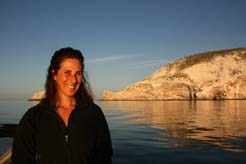
Sarah Mesnick is the Science Liaison for the Southwest Fisheries Science Center (SWFSC), NOAA Fisheries Service, an ecologist in the SWFSC's Marine Mammal and Turtle Division, and co-founder of the Center for Marine Biodiversity and Conservation (CMBC) at Scripps Institution of Oceanography, U.C. San Diego. Her research focuses on the behavioral and molecular ecology of marine mammals and provides a behavioral framework within which to investigate population identity, population trends, and fishery interactions in marine mammals of temperate and tropical oceans.
Sarah arrived at the SWFSC in 1997 as a National Research Council (NRC) post-doctoral researcher to study the genetic structure of sperm whales in the North Pacific and in 2000 was awarded a NRC senior research fellowship to study the impact of the purse-seine fishery for tuna on the behavior of pelagic dolphins. In 2001, she joined the Scripps community to establish the Center for Marine Biodiversity and Conservation, a unique interdisciplinary graduate program in marine science and conservation, in partnership with the SWFSC. In 2003, Sarah was hired as the Academic Liaison at the SWFSC and in 2005 the position was expanded to encompass the Center's external relations.
Sarah serves on the graduate committee of several PhD and masters students at Scripps Institution of Oceanography and at universities in Mexico. She has authored or co-authored 45 peer-reviewed papers, book chapters, and reports on the behavior and genetic structure of marine mammal populations. Recently, she and colleagues have focused on the value of acoustic characters in identifying populations of blue whales, social disruption in tropical dolphins, and North Pacific and global genetic structure of sperm whales. She is involved in collaborative research in support of the International Dolphin Conservation Program, Federal Protected Resources, the NOAA Fisheries Service's Alaska and Southwest Region and the International Whaling Commission. Her research and academic work has been supported by the National Science Foundation, the Marine Mammal Commission, National Geographic and the North Pacific Research Board. She holds a doctorate (1996) and masters (1991) from the University of Arizona in Ecology and Evolutionary Biology and graduated with honors from the University of California Santa Cruz (1983).
As the Science Liaison for the SWFSC, Sarah provides direction and support for the Center's external relations and the dissemination of the Center's science to a broad audience. Sarah serves as the SWFSC's liaison with agency, legislative and external partners and works closely with the Director's Office and research Divisions to build and support science and infrastructure initiatives. She serves as the SWFSC's liaison with academia, co-chairs NOAA Fisheries Service's Higher Education working group and is a member of the NOAA Fisheries Education Council. Sarah is a member of the steering committee for CMBC at Scripps Institution of Oceanography and has twice received the U.C. San Diego's Vice Chancellor's award for promoting diversity. Sarah is a member of the NOAA Fisheries Communication Team and serves as the SWFSC webmaster and coordinates media relations. As outreach coordinator for the SWFSC, she directs scientific conferences and public events.
George Watters became Director of the Antarctic Ecosystem Research Division (AERD) in 2009; the division conducts research to advise the Commission for the Conservation of Antarctic Marine Living Resources (CCAMLR) on the management of fisheries around Antarctica. George has been involved with Antarctic fisheries issues since 1991, when he first started work at the Southwest Fisheries Science Center as a GS-7 fishery biologist within the AERD and a Ph.D. student at the Scripps Institution of Oceanography. George's research centers on the using quantitative tools, particularly ecosystem and population models, to evaluate hypotheses describing alternative views about the production of living marine resources and advise on strategies for their sustainable management. For example, he developed an ecosystem model that has been used to advise on the degrees to which various options for spatially distributing catches of Antarctic krill among a network of coastal and offshore management areas in the Scotia Sea may risk depleting krill-dependent predators like penguins and seals. George presently chairs the CCAMLR Working Group on Ecosystem Monitoring and Management. This working group advises the CCAMLR and its Scientific Committee on issues related to management of the Antarctic krill fishery and spatial management (e.g., marine protected areas).
Newell (Toby) Garfield, Ph.D.
Director, Environmental Research Division
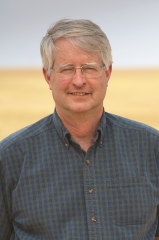
Toby Garfield became the director of the Environmental Research Division, NOAA Southwest Fisheries Science Center in 2013. He is a physical oceanographer and has concentrated his research on shelf, coastal and estuarine circulation. For the last 25 years Toby has studied the California Current System using multiple observing tools, including traditional ship surveys, satellite remote sensing, moored instrument arrays, RAFOS Lagrangian drifters, and land-based HF radar. Toby earned his BA in geology from Williams College (1973), an MSc in Marine Sciences from the University of Delaware (1977) and a PhD in physical oceanography from the University of Rhode Island (1990).
Prior to joining ERD, Toby was a research professor at the Naval Postgraduate School, Monterey from 1989-1998 and professor of oceanography at San Francisco State University from 1998-2013. He served as the Director of SF State's Romberg Tiburon Center for Environmental Sciences from 2006-2013. He remains an Adjunct Professor in SF State's Department of Earth & Climate Sciences. He has been involved with numerous process studies and as one of the principle investigators of the California-supported Coastal Ocean Currents Monitoring Program that established a complete array of HF radar antennas to monitor surface circulation along the entire California Coast, is promoting large-scale ocean monitoring. This west coast array is the largest HF radar array in the world. Toby has served on the Executive Council of the NOAA IOOS-supported Central and Northern California Ocean Observing System and the California State University's Council on Ocean Affairs, Science and Technology. Toby is a Fellow of the California Academy of Sciences and serves on the Advisory Council of the California Sea Grant.
Steve Lindley, Ph.D.
Director, Fisheries Ecology Division
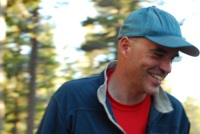
Steve Lindley became director of the Fisheries Ecology Division in 2011. Steve started as a research ecologist with NMFS at the Tiburon Lab in 1996, and was the founding team leader of the FED's Landscape Ecology Team in 2005. He received a BA in aquatic biology from UC Santa Barbara, a PhD in biological oceanography from Duke University, and was a postdoctoral fellow at Stanford University before joining NMFS.
Steve's research interests include population dynamics, ecosystem ecology, quantitative methods, and the linkages between physical and biological processes. His research with NMFS has focused on endangered anadromous fish such as Chinook salmon, steelhead and green sturgeon. He chaired the technical recovery team for Chinook salmon and steelhead in California's Central Valley, has participated in numerous biological review teams to determine the conservation status of anadromous fishes, and led the investigation into the 2007-2009 collapse of the Chinook salmon fishery off California.
Gerard DiNardo became the Director of the Fisheries Resources Division (FRD) at the Southwest Fisheries Science Center (SWFSC) in March 2015. He first began working at NOAA Fisheries at the Pacific Islands Fisheries Science Center (PIFSC) in 1992, where he conducted investigations on high-sea fishery impacts and pelagic stock assessments before migrating to the insular stock assessment arena. In 2004, Gerard became Program Leader of the PIFSC Stock Assessment Program, a group responsible for conducting domestic and international stock assessments. Gerard received his Ph.D. in Marine, Estuarine, and Environmental Sciences from the University of Maryland, where he worked on a suite of local and international fishery projects.
Gerard's research interests include population dynamics, spatial modeling and sampling, and the development of decision support tools to support stock assessments and marine resource stewardship. He presently chairs the International Scientific Committee for Tuna and Tuna-like Species in the North Pacific Ocean (ISC), an independent scientific organization comprised of seven member countries and four cooperating non-members. ISC is responsible for conducting research and stock assessment on highly migratory species in the North Pacific Ocean and presently serves as the science provider to the Northern Committee of the Western and Central Pacific Fisheries Commission (WCPFC), a tuna RFMO responsible for the stewardship of tuna and tuna-like resources across the western and central areas of the Pacific Ocean.
Lisa Ballance has been the Director of the Marine Mammal and Turtle Division at the Southwest Fisheries Science Center, NOAA Fisheries Service, since November of 2007. In this role, she is responsible for setting the research priorities in accordance with division mandates for seven programs and some 70 individuals, and for day-to-day management of division resources.
Lisa has been with NOAA Fisheries Service since 1988, when she joined the agency as a Graduate Research Associate working on her Ph.D. Her research focused on ecology of seabirds associated with yellowfin tuna and spotted and spinner dolphin schools in the eastern tropical Pacific. She obtained her doctoral degree from the University of California Los Angeles in 1993, and accepted a post-doctoral position the same year with the National Research Council conducting research on comparative cetacean ecology in the eastern tropical Pacific and tropical Indian oceans. She became a marine ecologist with the Southwest Fisheries Science Center in 1996, Chief Scientist of the Eastern Tropical Pacific Cetacean and Ecosystem Research Cruises in 1999, and Leader of the Ecosystem Studies Program in 2001. In addition to her doctorate, she holds a Master of Science degree from Moss Landing Marine Laboratories (1987) and a Bachelor of Science degree from the University of California San Diego (1981). Her research has always included a strong ecological component and is heavily focused on cetaceans and seabirds in oceanic systems, ecological trends in space and time (at interannual to regime shift scales), and ecosystem-based approaches to management.
Lisa is an Adjunct Professor at the Scripps Institution of Oceanography and primary adviser to three Ph.D. students. She is an editorial board member of Marine Ornithology, Past Chair of the Pacific Seabird Group (2002), and recipient of the Department of Commerce Silver Medal (2003) and NOAA Fisheries Supervisor of the Year (2007) awards. Her research, documented in 39 peer-reviewed publications and 34 Technical Reports, has been supported by grants from NOAA, the National Science Foundation, National Geographic Society, World Wildlife Fund, and International Fund for Animal Welfare.
Robert L. Brownell, Jr. Ph.D.
Senior Scientist for Marine Mammals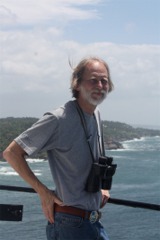
Robert L. Brownell, Jr. is Senior Scientist for Protected Resources at the Southwest Fisheries Science Center (SWFSC), NOAA Fisheries Service, in Pacific Grove, California. He has conducted research on the biology and conservation of whales, dolphins and porpoises throughout the world with major studies in Mexico, South America, Japan, and Russia. Since 1995, Bob has led the U.S. side of the joint Russian-American research on the western gray whale off Sakhalin Island. He has published over 200 scientific papers, book chapters, and management documents on various aspects of whale, dolphin, and porpoise biology, conservation, and management. He has been a member of the U. S. delegation to the International Whaling Commission (IWC) since 1975 and served as Vice-Chair and Chair of the IWC's Scientific Committee from 1985 to 1991. He also served as President of the largest international society for marine mammals, The Society for Marine Mammalogy, from 1987 to 1989. Before joining NOAA, Bob served as the Chief of Marine Mammal Research for the U.S. Fish and Wildlife Service from the late 1970s to 1991. Between 1991 and 1993, he was the Science Advisor to the Assistant Secretary for Oceans at the U.S. Department of State. In 1993, Bob became the Director of the Marine Mammal Division (now the Marine Mammal and Turtle Division) at the SWFSC in La Jolla, California, and then took up his present position two years ago. He has also been a member of the various marine mammal specialist groups under the IUCN (The World Conservation Union) for about 30 years and has served three terms as a Scientific Advisor to the U.S. Marine Mammal Commission.
Russ Vetter, Ph.D.
Senior Scientist for Fish Genetics and Aquaculture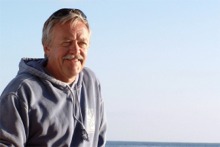
Russ Vetter is Senior Scientist for Fish Genetics and Aquaculture. Russ's personal research interests have focused on Molecular Ecology and Spatial Ecology of fishes as revealed by studies of population genetic structure, electronic tagging of migratory animals, and the application of biotechnology and physiology to investigate effects of environmental stress on natural populations. Before becoming a Senior Scientist, Russ was the Director of the Fisheries Resources Division and previous to this, oversaw the Division's Fish Ecology and Fish Conservation Genetics Programs. The majority of his recent research has focused on determining population connectivity among rockfish meta-populations, the design and spacing of MPA networks, the effects of ozone depletion and increased ultraviolet (UV) irradiance on eggs and larvae, the movements of sharks and other large pelagic fishes and the bioenergetics of pelagic food webs.
Previous to joining the Southwest Fisheries Science Center, Dr. Vetter was an Andrew Mellon Foundation Fellow and a member of the research faculty at Scripps Institution of Oceanography where he conducted research on the physiology and biochemistry of hydrothermal vent organisms. Dr. Vetter received his Masters in physiology from the University of Texas and his Ph.D in biochemistry from the Institute of Ecology at the University of Georgia. Prior to graduate studies, he served in the Peace Corps where he was posted to Ethiopia in the Horn of Africa. He is the author of over 75 journal papers, several book chapters, and technical reports.